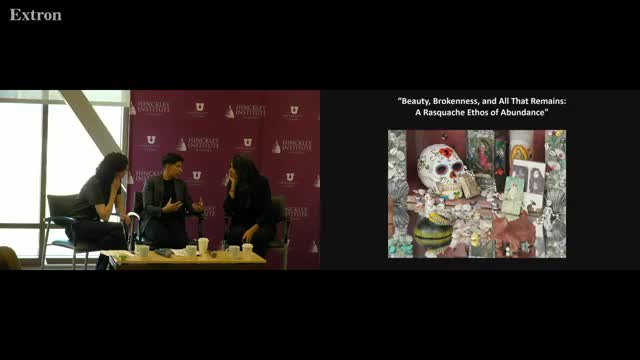Beltrán urges ‘affective abundance,’ rasquachismo as a counter to eliminationist politics
Get AI-powered insights, summaries, and transcripts
Subscribe
Summary
Christina Beltrán, associate professor in the Department of Social and Cultural Analysis at New York University, told a Hinckley Institute forum at the University of Utah that progressives should embrace a "politics of affective abundance"—drawing on rasquachismo and domesticana aesthetics—to counter right‑wing eliminationist politics.
Christina Beltrán, associate professor in the Department of Social and Cultural Analysis at New York University, delivered the Neil A. Maxwell Lecture in Political Theory and Contemporary Politics at a Hinckley Institute forum at the University of Utah, urging progressives to adopt what she called a "politics of affective abundance" that refuses the right’s "zero‑sum" and eliminationist logic.
Beltrán framed the argument at the center of a forthcoming book, Latinos and Other Uncertainties on Desire, Difference, and the Rise of Multiracial Conservatism. "It's a politics I'm calling affective abundance," she said, describing that politics as a coalition‑building orientation that highlights joy, beauty and pleasure as persuasive political tools. She warned that contemporary right‑wing rhetoric often treats political opponents as illegitimate or subhuman and therefore seeks not merely defeat but erasure.
Why it matters: Beltrán said the right’s eliminationist imaginary—she referenced public rhetoric that depicts opponents as "the enemy within"—makes shared democratic rule difficult. To counter that, she proposed political practices that acknowledge ambivalence, reuse and repurposing of culture, and emotionally appealing visions of collective thriving. "A politics of affective abundance," she said, "is a coalitional and popular front orientation that recognizes that we are both doomed and gifted to share the world with people whose desires, dreams, and impulses are as conflicted and abundant as our own."
Most of the lecture drew on three bodies of work. Beltrán repurposed Lauren Berlant’s notion of "inconvenience"—the affective friction of coexisting with others—to propose "loosening" as a political method, and she used Tomás Ybarra‑Frausto’s concept of rasquachismo and Amalia Mesa‑Bains’s domesticana altars as aesthetic models for making abundance from scarcity. Rasquachismo, she said, is a working‑class, barrio baroque sensibility that recombines found objects into striking new forms; domesticana, Beltrán argued, highlights layered altars and ofrendas that hold grief, critique and sensuality together.
Beltrán presented rasquachismo as an "infrastructure" for political repair and persuasion: rather than discarding damaged institutions or identities, she asked, what can be recombined and made to invite a broader public to imagine thriving lives? Drawing on Mesa‑Bains’s installations and Ybarra‑Frausto’s writings, she described altars and cabinets of curiosity as spaces that can hold complexity—beauty, sorrow, critique—without defaulting to purity or elimination.
Commentators Andrea (Andreas) Pitts, associate professor and director of graduate studies in Comparative Literature at the University at Buffalo, and Lisa Beard, associate professor of political science at Western Washington University, offered supportive critiques. Pitts asked how the rasquachismo/domesticana ethos might address gendered attachments to pleasure and whether those aesthetics can reach cisgender, heterosexual men; Beard emphasized nondiscarding as a political strategy and linked Beltrán’s argument to abolitionist and queer feminist practices that already imagine abundance rather than mere absence.
During a roughly 30‑minute audience Q&A, attendees asked how to translate the theory into everyday outreach and organizing. An audience member asked how to converse with people whose rhetoric devolves into labels such as "enemy" or "terrorist;" others pressed about whether an aesthetics of abundance risks placing the burden of cultural work on women or on already marginalized groups. Beltrán and the commentators returned repeatedly to two themes: the importance of meeting people where they are through narrative and practice, and the need to build imaginative, attractive alternatives that allow uncertain or ambivalent citizens to envision a better future.
Beltrán acknowledged risks: rasquachismo can look like hoarding if practiced individually rather than collectively, and rhetorical appeals to "abundance" may be co‑opted by political actors who couple exuberance with exclusion. Still, she argued, offering emotionally rich, pleasurable visions of shared life can undercut the right’s eliminationist appeal by making alternative futures feel desirable.
The forum concluded with an extended round of audience questions and applause. The event was introduced by Rory Stewart, the forum host, and by Steve Johnston, who holds the Neil A. Maxwell chair in political theory and contemporary politics.
Ending: Beltrán said her lecture represents the conclusion of her forthcoming book and that she will discuss practical applications further during questions. The forum invited attendees to continue the conversation informally after the program ended.
